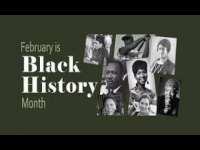Saying No to Black History Month
https://www.americanthinker.com/articles/2020/02/saying_no_to_black_history_month.html
Yep.
Barbara Kay: The reframing of African-American history
The National Association of Scholars (NAS), an American non-profit whose mandate is to “uphold the standards of a liberal arts education that fosters intellectual freedom” by advocating for the academic freedom of students and scholars, has inaugurated the 1620 Project, which will commemorate the signing of the Mayflower Compact, the first governing document of the Plymouth Colony, which the British established in New England. The project was conceived as a rebuttal to the New York Times Magazine’s controversial 1619 Project, which was launched last August with a 100-page spread.
The 1619 Project is described as “a major initiative from the New York Times observing the 400th anniversary of the beginning of American slavery (when 20 slaves from Africa arrived in Jamestown, Va.). It aims to reframe the country’s history, understanding 1619 as our true founding, and placing the consequences of black Americans at the very centre of the story we tell ourselves about who we are.”
“Who we are” is, according to the project’s contributors, a bleakly divided nation of oppressors and oppressed — always was, always will be. In her long and plangent j’accuse, African-American journalist Nikole Hannah-Jones, the “architect” and lead author of the 1619 Project, writes that America was arguably “founded not as a democracy but as a slavocracy.” She claims that “anti-black racism runs in the very DNA of this country.” That flagellatory thrust has set the tone for everything else — essays, poems, short fiction — that has been published under the 1619 Project. In this reframed portrait of America, victimization of African-Americans, in all its many continuing guises, replaces the alleged myths of American exceptionalism, moral aspiration and advancements in the pursuit of true equality.
The NAS’ 1620 Project — which features essays, podcasts and interviews – is one institutional example of the intense blow-back to the 1619 Project. On the 1619 Project’s website, one will find rational, evidence-based refutations of many of Hannah-Jones’ audacious and undocumented claims, such as her contention that double-entry bookkeeping was an initiative “whose roots twist back to slave-labour camps.” That example was cited in a fierce op-ed written by Roger Kimball that takes issue with the 1619 Project in the January issue of The New Criterion.
Distinguished historian Allen C. Guelzo wrote a blistering rebuke to the series in the December issue of City Journal, in which he argues that: “the 1619 Project is not history; it is conspiracy theory. And like all conspiracy theories, the 1619 Project announces with a eureka! that it has acquired the explanation to everything, and thus gives an aggrieved audience a sense that finally it is in control, through its understanding of the real cause of its unhappiness.”
Many other leading historians on the relevant periods of American history were offended by some fundamental errors they found in the project’s narratives, and were not shy about saying so. Pulitzer-Prize winning historians Gordon Wood and James McPherson, along with Victoria Bynum, Sean Wilentz and James Oakes, who amongst themselves have devoted 250 years to analyzing the American Revolution, the Civil War and the Reconstruction era (yet were not consulted for the project), wrote a letter to the Times, requesting corrections to a number of historical falsifications.
Jake Silverstein, the editor of the New York Times Magazine, refused to correct the mistakes cited by the scholars. In a response to their letter, he stated that, “The project was intended to address the marginalization of African-American history in the telling of our national story and examine the legacy of slavery in contemporary American life. We are not ourselves historians, it is true. We are journalists, trained to look at current events and situations and ask the question: Why is this the way it is?”
This is an open admission that the project was conceived, not as an interpretation of history grounded in factual evidence, but as a contrition-driven form of social justice activism for African-Americans. For her part, Hannah-Jones, who holds an undergraduate degree in history and African-American studies and a master’s in journalism, shrugged off her fact-focused scholarly critics as “old, white male historians.”
If it were only politically correct adult readers of the New York Times who were hooked on the project’s theme of national self-loathing, it would be just another cause for eye-rolling by opponents of identity politics. But this year, the Times will expand the project into a book and adapt classroom materials from it. The 1619 Project is therefore likely to end up as received historical wisdom for many public-school children.
Columbia University academic and race-relations specialist John McWhorter, who is black, wrote in Reason magazine that because of the 1619 project, “black people will internalize an even deeper sense that America is not great and doesn’t like them, in the only country they will ever know.” He adds, sorrowfully, that, “At no other point in human history have any people, under any degree of oppression, conceived of this kind of self-image as healthy.” It’s a sad thought, but it’s true.
nationalpost.com/opinion/barbara-kay-the-reframing-of-african-american-history


